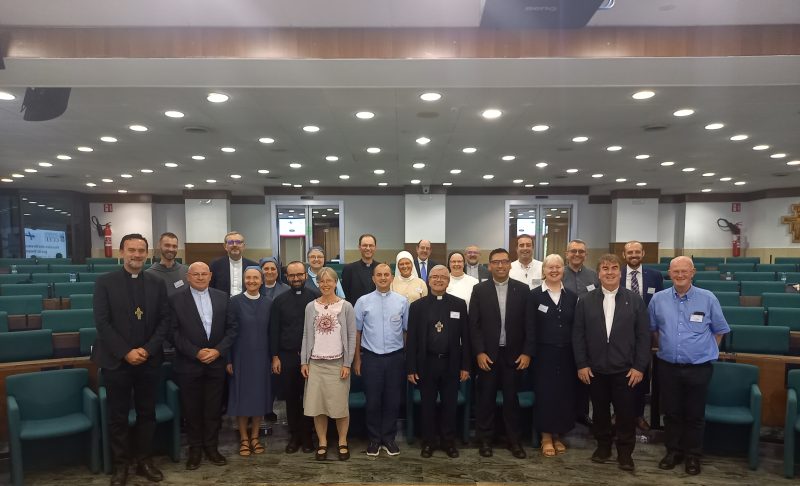The Bishops and Directors of the National Offices for Vocations of the European Bishops’ Conferences met in Rome from 28 September to 1 October to discuss “Synodal Discernment and Accompaniment in the Care of Vocations”. The reflection started from the fruits of World Youth Day 2023 in Lisbon and also touched upon aspects of vocational pastoral care in the university world. On the evening of 29 September, Archbishop Gintaras Grušas, CCEE President, presided over Holy Mass at the Basilica of the Santi Quattro Coronati (Four Crowned Saints) in Rome. On the afternoon of 30 September, delegates made a pilgrimage to St. Peter’s Square to take part in the ecumenical vigil called Together, organised by the Taizé Community, in order to entrust to the Holy Spirit the work of the first session of the 16th Ordinary Assembly of the Synod of Bishops “for a synodal Church”, which will begin on 4 October.
In his greeting, Cardinal Matteo Zuppi, President of the Italian Bishops’ Conference, emphasised that today “due to widespread individualism, communication is increasingly tinged with aggression, and behaviour that emphasises the negative of others as individuals to be defended against” and “lacks – on the other hand – the care of relationships that enables each one to cultivate trust in others”. Vocations are never born “in a laboratory or test tube” but always “in a network of relationships. It is the fruit of communion for communion’s sake”.
Therefore, the vocational proposal must start “precisely from the commitment to revisit relational capacity at all levels, to identify the meaning of life that takes shape, step by step, through the relationship with Jesus Christ”.
Sister Nathalie Becquart, Undersecretary of the General Secretariat of the Synod of Bishops, gave a talk on the “Synodal processes”, She also shared her personal experience of the Youth Synod. In her words, the Synod witnessed the transition from a Church that teaches “from top to bottom”, to a Church that “listens – learns”, according to the model of the “Communion in Mission”, reconceiving “radically the distinction between hierarchies and the ecclesia docens and laity and the ecclesia discens”.
The day of 29 September was opened with a reflection by br. Alois Löser, Prior of the Taizé Community. In describing his experience in the French ecumenical community, he stated that a “vocational journey without prayer – community prayer, sung praise with others and especially the silence of being alone with God” is not possible. “We are not alone in following Christ, but accompanied by this mystery of communion that is the Church”, concluded br. Alois.
Archbishop Claudio Giuliodori, General Ecclesiastical Assistant at the Catholic Sacred Heart University in Milan and President of the CCEE Youth Commission, spoke of “University, Youth and Vocations”. In his address, he analysed the essential condition of young Europeans, which is that of “pilgrims”, because they are “seekers of meaning” in a way that sees the “cracked myth of modernity and science”. For the archbishop it is necessary “to risk proposing strong and courageous proposals”, with “modern vocational codes”, using “the dissatisfaction and restlessness of these young people as resources” from which to start. There are many challenges ahead, from integral ecology to migration, via a rethinking of society, the economy, and politics to “starting from the primacy of the spiritual dimension”.
On 30 September, Archbishop José Manuel Garcia Cordeiro of Braga, head of the Vocations/EVS Section of the CCEE Youth Commission, addressed the challenges after the World Youth Day in Lisbon. The archbishop noted that the WYD experience showed that “the Church is alive and has a future despite the complexity of current problems and situations”, and defined, from that experience, five trajectories in which to go deeper, which focus on the experience of Adoration for greater discernment.
On the other hand, Fr. António Jorge dos Santos Almeida, Secretary for the Episcopal Commission for Vocations and Ministries of the Portuguese Bishops’ Conference, defined a decalogue of challenges: to be outgoing, listening, accompanying young people, rethinking spaces, looking at vocational models, working on language, strengthening synodal commitment, training, encouraging young people and highlighting the commitment of diakonia in the Church, such as co-responsibility.

